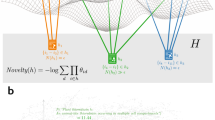Abstract
Many researchers, especially during the early stage of their career, focus on a narrow topic so as to achieve economies of scale in their research activities. The research path that I have followed during the last ten years or so is, to a significant extent, guided by intellectual curiosity and has led to several distinct streams of research. My own experience shows that this alternative research path can be more intellectually stimulating. It is a worthwhile long-term investment that researchers may like to consider.
Similar content being viewed by others
References
M. A. Berry and D. A. Rondinelli, “Carrying out a successful privatization.” Academy of Management Executive, vol. 12, no. 2, pp. 38–50, 1998.
J. R. Bettman and B. A. Weitz, “Attributions in the board room: Causal reasoning in corporate annual reports.” Administrative Science Quarterly, vol. 28, pp. 165–183, 1983.
I. Choi, R. E. Nisbett, and A. Norenzayan, “Causal attribution across cultures: Variation and universality.” Psychological Bulletin, vol. 125, pp. 47–63, 1999.
R. Dale, “Crisis stills apologists for corruption.” International Herald Tribune, January 21, 1999.
R. J. David and S. -K. Han, “A systematic assessment of the empirical support for transaction cost economics.” Strategic Management Journal, vol. 25, pp. 39–58, 2004.
G. F. Davis, “American cronyism: How executive networks inflated the corporate bubble.” Contexts, vol. 2, no. 3, pp. 34–40, 2003.
M. Friedman, Essays in Positive Economics. Chicago, IL: University of Chicago Press, 1953.
R. Hubbard, D. E. Vetter and E. L. Little, “Replication in strategic management: Scientific testing for validity, generalizability, and usefulness.” Strategic Management Journal, vol. 19, pp. 243–254, 1998.
A. C. Inkpen and E. W. K. Tsang, “Social capital, networks, and knowledge transfer.” Academy of Management Review, vol. 30, pp. 146–165, 2005.
N. Khatri and E. W. K. Tsang, “Antecedents and consequences of cronyism in organizations.” Journal of Business Ethics, vol. 43, pp. 289–303, 2003.
N. Khatri, E. W. K. Tsang, and T. M. Begley, “Cronyism: A cross-cultural analysis.” Journal of International Business Studies, 2006 (in press).
K. -M. Kwan and E. W. K. Tsang, “Realism and constructivism in strategy research: A critical realist response to Mir and Watson.” Strategic Management Journal, vol. 22, pp. 1163–1168, 2001.
M. Levin, “The reification-realism-positivism controversy in macromarketing: A philosopher's view.” Journal of Macromarketing, vol. 11, no. 1, pp. 57–65, 1991.
Lianhe Zaobao, “Korea moves capital, involving 400 feng shui experts.” August 1, 2005 (in Chinese).
R. Mir and A. Watson, “Strategic management and the philosophy of science: The case for a constructivist methodology.” Strategic Management Journal, vol. 21, pp. 941–953, 2000.
M. W. Peng, “Perspectives - From China strategy to global strategy.” Asia Pacific Journal of Management, vol. 22, pp. 123–141, 2005.
M. W. Peng and Y. Luo, “Managerial ties and firm performance in a transition economy: The nature of a micro-macro link.” Academy of Management Journal, vol. 43, pp. 486–501, 2000.
M. W. Peng, Y. Zhou, and A. York, “Behind make or buy decisions in export strategy: A replication and extension of Trabold.” Working paper, University of Texas at Dallas, 2005.
K. Popper, The Logic of Scientific Discovery. London: Hutchison & Co, 1959.
T. C. Powell, “The philosophy of strategy.” Strategic Management Journal, vol. 23, pp. 873–880, 2002.
K. Singh, S. H. Ang and S. M. Leong, “Increasing replication for knowledge accumulation in strategy research.” Journal of Management, vol. 29, pp. 533–549, 2003.
E. W. K. Tsang, “Organizational learning and the learning organization: A dichotomy between descriptive and prescriptive research.” Human Relations, vol. 50, pp. 73–89, 1997.
E. W. K. Tsang, “Foreign direct investment in China: A consideration of some strategic options.” Journal of General Management, vol. 24, no. 1, pp. 15–34, 1998a.
E. W. K. Tsang, “Can guanxi be a source of sustained competitive advantage for doing business in China?” Academy of Management Executive, vol. 12, no. 2, pp. 64–73, 1998b.
E. W. K. Tsang, “Internationalization as a learning process: Singapore MNCs in China.” Academy of Management Executive, vol. 13, no. 1, pp. 91–101, 1999.
E. W. K. Tsang, “Transaction cost and resource-based explanations of joint ventures: A comparison and synthesis.” Organization Studies, vol. 21, pp. 215–242, 2000.
E. W. K. Tsang, “Managerial learning in foreign-invested enterprises of China.” Management International Review, vol. 41, pp. 29–51, 2001.
E. W. K. Tsang, “Acquiring knowledge by foreign partners from international joint ventures in a transition economy: Learning-by-doing and learning myopia.” Strategic Management Journal, vol. 23, pp. 835–854, 2002a.
E. W. K. Tsang, “Self-serving attributions in corporate annual reports: A replicated study.” Journal of Management Studies, vol. 39, no. 1, 51–65, 2002b.
E. W. K. Tsang, “Superstition and decision-making: Contradiction or complement?.” Academy of Management Executive, vol. 18, no. 4, pp. 92–104, 2004a.
E. W. K. Tsang, “Toward a scientific inquiry into superstitious business decision-making.” Organization Studies, vol. 25, pp. 923–946, 2004b.
E. W. K. Tsang, “Influences on foreign ownership level and entry mode choice in Vietnam.” International Business Review, vol.14, pp. 441–463, 2005a.
E. W. K. Tsang, “Behavioral assumptions and theory development: The case of transaction cost economics.” Paper presented at the Academy of Management Annual Meeting, Honolulu, U.S.A., 2005b.
E. W. K. Tsang and K.-M. Kwan, “Replication and theory development in organizational science: A critical realist perspective.” Academy of Management Review, vol. 24, pp. 759–780, 1999.
R. L. Tung, “New era, new realities: Musings on a new research agenda ... from an old timer.” Asia Pacific Journal of Management, vol. 22, pp. 143–157, 2005.
Author information
Authors and Affiliations
Corresponding author
Rights and permissions
About this article
Cite this article
Tsang, E.W.K. Economies of scale versus intellectual curiosity. Asia Pacific J Manage 23, 157–165 (2006). https://doi.org/10.1007/s10490-006-7164-y
Issue Date:
DOI: https://doi.org/10.1007/s10490-006-7164-y




